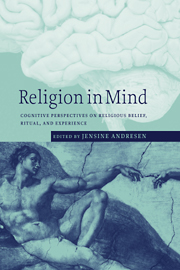Book contents
- Frontmatter
- Contents
- Notes on contributors
- 1 Introduction: towards a cognitive science of religion
- PART I BELIEF ACQUISITION AND THE SPREAD OF RELIGIOUS REPRESENTATIONS
- PART II QUESTIONING THE “REPRESENTATION” OF RELIGIOUS RITUAL ACTION
- 5 Ritual, memory and emotion: comparing two cognitive hypotheses
- 6 Psychological perspectives on agency
- 7 Do children experience God as adults do?
- PART III EMBODIED MODELS OF RELIGION
- Index
7 - Do children experience God as adults do?
Published online by Cambridge University Press: 02 December 2009
- Frontmatter
- Contents
- Notes on contributors
- 1 Introduction: towards a cognitive science of religion
- PART I BELIEF ACQUISITION AND THE SPREAD OF RELIGIOUS REPRESENTATIONS
- PART II QUESTIONING THE “REPRESENTATION” OF RELIGIOUS RITUAL ACTION
- 5 Ritual, memory and emotion: comparing two cognitive hypotheses
- 6 Psychological perspectives on agency
- 7 Do children experience God as adults do?
- PART III EMBODIED MODELS OF RELIGION
- Index
Summary
Concepts organize experiences, including religious experiences (Boyer 1994). The reason so many “religious” events and ideas seem radically different from ordinary experiences is that they violate a few default assumptions about things in the world. For example, a religious person who can never die is bizarre because never dying challenges the concept of “person,” even if the person is a religious figure. Note, however, that if the vast majority of our assumptions about persons do not apply to this religious person who cannot die, this being would not be identifiable as a person, and a non-person never dying is not necessarily very interesting.
Ordinary conceptual structures also shape experiences of religious actions such as rituals. While religious rituals may be attributed multiple levels of meaning, and while they present a hermeneutic problem to even the most savvy participants, ritual actions are still actions that have manifest similarities with all other actions (Lawson and McCauley 1990; forthcoming). A ritual drummer ritually beating a ritual drum is still a drummer beating a drum. The relationship between the drummer and the drum is only clear because of an understanding of action events. In these and many other ways, concepts structure religious ideas and experiences. Perhaps the most important concept impacting on religious life is the concept of intentional agency (Lawson; Lawson and McCauley 1990). After all, the vast majority of the world's religions, if not all of them, center on the actions of special intentional agents such as gods. Given the importance of these agents and the important role concepts play in shaping these agents' experiences, understanding how agents are conceptualized throughout development is essential for a complete understanding of religious experience.
- Type
- Chapter
- Information
- Religion in MindCognitive Perspectives on Religious Belief, Ritual, and Experience, pp. 173 - 190Publisher: Cambridge University PressPrint publication year: 2001
- 9
- Cited by



